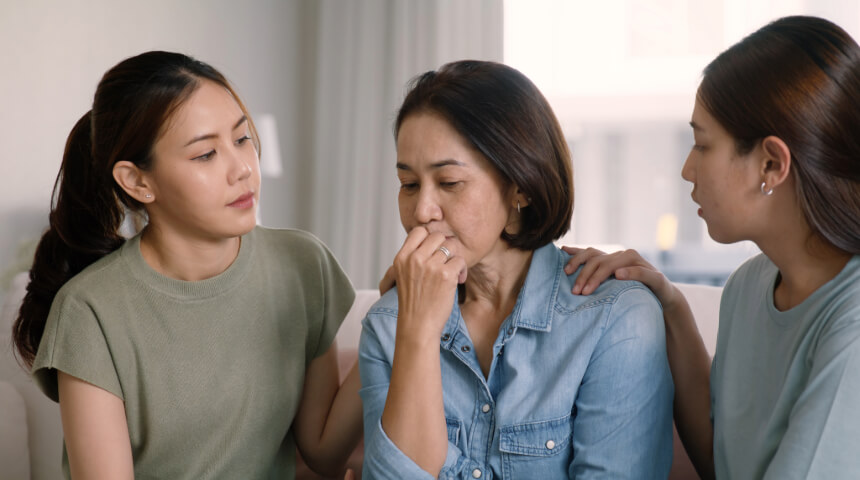Groundbreaking Cancer Treatment Gives Grandmother New Chance at Life
By Sandra Pedicini, Editorial Contributor
A woman of strong religious faith, Toni English is not a worrier by nature. After getting a severe nosebleed, she was concerned but not alarmed. It was probably a reaction to some nasal sprays she was taking for allergies, she told herself.
Then came a second nosebleed, and a third — so bad that English’s boss took her aside and strongly recommended she see a doctor.
An ear, nose and throat specialist told English he could see tumor tissue in her nose. After a biopsy, he gave her the horrible news: suffering from a rare cancer, she likely wouldn’t live more than six months.
English had sinonasal mucosal melanoma, an aggressive cancer that forms in the mucous membranes.
She and her stunned husband, Roger, took each other by the hands. “It was like I’d been punched in the gut,” she said.
Then she thought to herself, “just watch me. I’m not taking that lying down. Just watch me.”
She didn’t know then that it would be a harrowing, yearslong fight.
After her diagnosis, English had surgery followed by 30 doses of radiation. Scans at follow-up appointments showed no cancer at three months, six, nine. But a year later, another punch in the gut: the cancer had returned. It was in English’s right kidney, both lungs and her brain.
It was a grim diagnosis. Once melanoma spreads to distant organs, it is considered stage IV and has low survival rates.
Gamma knife radiation shrunk the tumor in English’s brain, and she started immunotherapy for the rest of the cancer.
Soon after, English learned she was going to become a grandmother, and she was faced with the possibility her grandchild may never get to know her.
She was filled with an even stronger desire to fight the cancer. She considered the news a “godwink” – a sort of divine coincidence.
“God said, ‘I’ve got this covered. To keep you distracted, I’m going to let you be excited about being a grandmother.’”
There were plenty of other things to keep English distracted as well. Roger decided to retire from his job so the couple could move from Georgia to Central Florida to be closer to their son and his growing family.
They settled in Rockledge, and English began seeing Dr. Sajeve Thomas, a board-certified medical oncologist and hematologist at Orlando Health Cancer Institute. He specializes in the treatment of melanoma, sarcoma, cellular therapy and clinical trials.
At first, English continued with the more traditional immunotherapy she’d started in Georgia. But it was not working, and it made her so ill she ended up in the hospital.
Meanwhile, a clinical trial of tumor-infiltrating lymphocyte (TIL) therapy was being developed by Iovance Biotherapeutics to treat melanoma that has spread or is inoperable with cell therapy, and Dr. Thomas was a principal investigator.
“I reached out probably every three months, knowing they were writing up protocol and trying to pick out sites,” he said. “We were honored and happy we were selected to participate in it.”
God said, ‘I’ve got this covered. To keep you distracted, I’m going to let you be excited about being a grandmother.’ – Toni English
TILs are immune cells within tumors. The body doesn’t make enough of them to fight cancer, so through the TIL therapy, they are extracted from the tumor and then replicated by the billions in a lab before being reinfused back into the patient.
The concept of the therapy had been around for decades, but the lengthy process of replicating the cells meant it was not a practical treatment. “There’s no way we could do that for every single patient,” Dr. Thomas said. Iovance’s new therapy, however, shrinks the time of replicating cells to just three weeks.
When Dr. Thomas asked English if she would be interested in the clinical trial, she was intrigued and hopeful. Even if it didn’t work for her, perhaps the trial could help others.
To qualify, English underwent a battery of tests including evaluations of her cardiovascular, pulmonary, kidney and liver function. She then had surgery to remove tumor tissue and received chemotherapy for about a week to destroy the immune cells that hadn’t been effective in fighting her cancer.
In April 2018, Dr. Thomas and the clinical research team were at English’s hospital bed as she received infusions of her new cancer-fighting TILs, in bags that arrive at Orlando Health frozen and are thawed shortly before delivery to the patient.
Drugs given simultaneously to stimulate the TILs can cause side effects such as plummeting blood pressure and high fevers. English experienced those and was monitored in the ICU. Once she stabilized, she was moved to a room where she stayed for a few days until her strength returned and she could walk a few laps around the hospital floor.
Six weeks later, Dr. Thomas told her the lung tumor had disappeared.
"They had my chest CT scan up on the computer, and Dr. Thomas had this big old grin on his face. He said, ‘Let me show you something. See this image of your lung here? That tumor is gone.’”
Within a few months, with no additional interventions, the cancer was gone from English’s kidney, too. English has been cancer-free for about five and a half years.
Right now, the therapy has about a 1 in 3 chance of success. “If patients are going to respond, it’s typically the very first scan at six weeks or 12 weeks,” Thomas said. “The next step is making sure it continues to stay that way. A year, two years later, four years later, nothing’s come back.”
In February 2024, the FDA approved Iovance’s TIL treatment, and Orlando Health is now one of 30 authorized centers — and the first in Florida — providing the therapy. This is the first cell therapy approved by the FDA for solid tumors.
English is honored to have been a pioneer in the treatment. Now 69, she enjoys gardening and spending time with her grandson and her husband. She is also an advocate for mucosal melanoma patients and helps promote a foundation that provides education and support.
“I can’t give enough accolades” to Dr. Thomas and the cancer institute, English said. “From the moment I made that first phone call explaining what I needed, it has been the most incredible experience.”
Further clinical research about TIL will focus on increasing the success rates, Dr. Thomas said.
The willingness of patients like English to participate in clinical trials is what helps doctors make progress in the fight against all types of cancers, he added.
“Not only did this therapy help Toni — she participated in something that potentially could help a lot of patients who now don’t have to go through clinical trials. It is helping others if it is a breakthrough.”









